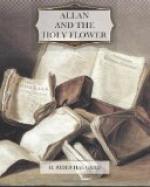“I may as well tell what perhaps you have guessed, that the picture is that of my wife, and the book is her book.”
“Is!” I exclaimed.
“Yes, Allan. I say is because I do not believe that she is dead. I cannot explain why, any more than I could explain last night how that great Zulu savage was able to prophesy my coming. But sometimes we can wring secrets from the Unknown, and I believe that I have won this truth in answer to my prayers, that my wife still lives.”
“After twenty years, John?”
“Yes, after twenty years. Why do you suppose,” he asked almost fiercely, “that for two-thirds of a generation I have wandered about among African savages, pretending to be crazy because these wild people revere the mad and always let them pass unharmed?”
“I thought it was to collect butterflies and botanical specimens.”
“Butterflies and botanical specimens! These were the pretext. I have been and am searching for my wife. You may think it a folly, especially considering what was her condition when we separated—she was expecting a child, Allan—but I do not. I believe that she is hidden away among some of these wild peoples.”
“Then perhaps it would be as well not to find her,” I answered, bethinking me of the fate which had overtaken sundry white women in the old days, who had escaped from shipwrecks on the coast and become the wives of Kaffirs.
“Not so, Allan. On that point I fear nothing. If God has preserved my wife, He has also protected her from every harm. And now,” he went on, “you will understand why I wish to visit these Pongo—the Pongo who worship a white goddess!”
“I understand,” I said and left him, for having learned all there was to know, I thought it best not to prolong a painful conversation. To me it seemed incredible that this lady should still live, and I feared the effect upon him of the discovery that she was no more. How full of romance is this poor little world of ours! Think of Brother John (Eversley was his real name as I discovered afterwards), and what his life had been. A high-minded educated man trying to serve his Faith in the dark places of the earth, and taking his young wife with him, which for my part I have never considered a right thing to do. Neither tradition nor Holy Writ record that the Apostles dragged their wives and families into the heathen lands where they went to preach, although I believe that some of them were married. But this is by the way.
Then falls the blow; the mission house is sacked, the husband escapes by a miracle and the poor young lady is torn away to be the prey of a vile slave-trader. Lastly, according to the quite unreliable evidence of some savage already in the shadow of death, she is seen in the charge of other unknown savages. On the strength of this the husband, playing the part of a mad botanist, hunts for her for a score of years, enduring incredible hardships and yet buoyed up by a high and holy trust. To my mind it was a beautiful and pathetic story. Still, for reasons which I have suggested, I confess that I hoped that long ago she had returned into the hands of the Power which made her, for what would be the state of a young white lady who for two decades had been at the mercy of these black brutes?




